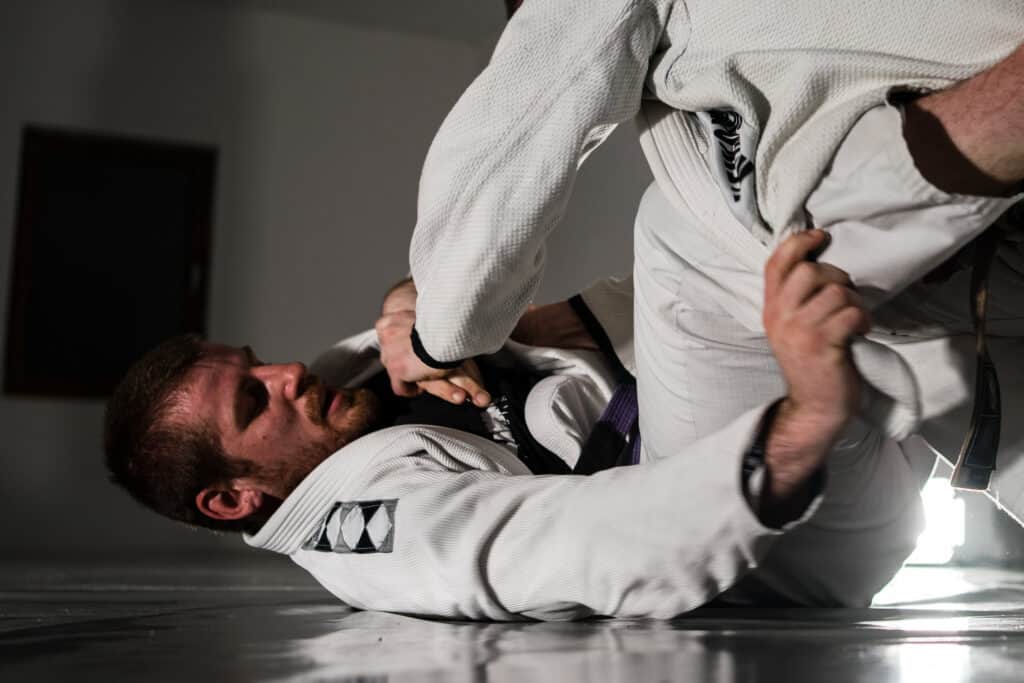
Brazilian jiu-jitsu is a demanding sport that requires mental and physical toughness. As with all workouts, recovery time is required to prevent injuries, build strength, and push one’s limits. Whether you’re a beginner or expert, it might be tempting to train BJJ every day in an effort to improve your skills on the mat.
You can train BJJ every day, but it’s recommended that you stick to 3 to 5 training sessions per week. Brazilian jiu-jitsu can be rough on your body, so it’s essential to rest for a few days. If you want to train daily, it’d be best to keep your gym sessions short and light for half of the week.
In this post, we’ll explain why you shouldn’t train daily (for most people), how often the ideal BJJ schedule requires training, tips to improve your recovery in between training sessions, and more.
Is It Okay to Train BJJ Daily?
Training BJJ every day might seem like a good idea if you want to seek the most improvement. However, injuries, exhaustion, burnout, and many other problems are results of hitting the gym too often. If you’re thinking about taking Brazilian jiu-jitsu classes every day of the week, consider the following tips:
- Keep the sessions short and light on some of your training days. If you want to train BJJ every day then you need to have some light days. This might look like simply drilling technique and flo rolling. Many people find it easier to go slow and work through the motions with a sparring partner rather than putting 100% effort into every session.
- Consider dedicating a specific transition or submission per day. Instead of confusing yourself with the dozens of movements found in a BJJ class, why not focus on takedowns earlier in the week and submissions later in the week? This layout will keep you prepared for every match.
- Focus on weekly improvement rather than jamming everything into each session. Your goal shouldn’t be to beat the previous day but rather the previous week. We all have off days, so it’s important not to worry too much if you’re training seven days in a row.
- You could train some of the days at home using BJJ Instructionals, virtual coaches, training partners, and more. BJJ lessons can get expensive, which is why a lot of people are leaning on other methods such as learning BJJ online.
- If you notice unusual amounts of pain, soreness, or stiffness, take it back a notch. Training every day can put unwanted stress on your mind and body. There’s no need to go overboard, especially if you’re a beginner. New exercises and working muscles you haven’t will make you prone to injuries if you’re not careful.
As you can see, there are many things you should think about before training Brazilian jiu-jitsu as often as possible. It’s a fun sport but should be practiced with caution and care. If you’re unsure how many times you should train BJJ each week, proceed to the next section.
How Many Times a Week Should You Train BJJ?
Training every day isn’t the best solution if you’re chasing toughness, higher belts, and so on. Contrary to popular belief, there’s a thing as too much exercise, especially when it comes to something as strenuous and repetitive as Brazilian jiu-jitsu. Below, you’ll find three factors that will show you how many times you should train.
Train Brazilian Jiu-Jitsu Three to Five Times Weekly
Most BJJ professors and higher belts would suggest that you should train Brazilian jiu-jitsu between three to five times per week. Do your best to leave a day between each training session for rest and go over your faults. Spacing the BJJ days will let you think about what you can improve and get ready for potential matches.
Of course, this is mostly recommended to the average BJJ practitioner. If you are looking to become a pro grappler or BJJ world champion then you might be training every day and sometimes multiple times per day. You have to consider your personal goals and everything else in life you need to balance. That said, training BJJ six times per week does not mean you will progress twice as fast as someone going three times per week.
Keep Your BJJ Goals in Mind
Many people suggest lowering your training intensity leading up to a match to prevent injuries and keep your body in top shape. Ask your coach how you can get closer to learning whichever moves you want to know. Much like the suggestion from the previous section, you can dedicate a day to each area of improvement.
Daily Training Doesn’t Always Equal More Improvement
Hitting the BJJ classes every second of every day won’t always make you better; sometimes It’ll end up doing much more harm than good. You’ll regret it because you won’t have to rest, recover, and enjoy the process. Getting enough downtime will let you appreciate each session so that you can approach it with more intensity and focus.
Some people find it easier to train twice weekly, whereas others need five days every week to see noticeable improvements. It’s up to you to find out how often you should take BJJ classes. Why not go to in-person classes three times a week and do virtual BJJ apps twice a week? You’ll get the best of both worlds!
How to Improve Recovery and Train BJJ Every Day
If you want to get the best results from each BJJ session, recovery is irreplaceable. However, waiting a day between each session isn’t your only solution. There are many ways to get back in healthy shape to hit the mats, so let’s dive into four proven ideas below.
- Go to the gym at the same time on each training day to give your body enough rest. It’s best not to train at night with a morning session on the following day. BJJ affects almost every muscle in your body, all of which need a day or so to recover. Keep your home training at the same time as your gym training.
- Warm-ups need to be a regular part of your daily routine. Takedowns, transitions, and submission defenses are much easier and safer if you warm-up; Otherwise, you’ll risk over-extending something and causing severe, long-lasting injuries. They’ll prevent you from going to BJJ gyms, which is the opposite of your goal!
- Your diet and sleep are equally important (if not more) for your recovery. Some people can function with only a few hours of sleep, but that doesn’t mean it’s healthy. Getting between seven to eight hours of sleep will get your body ready to recover and heal before you train again.
- Start slow, then ramp up to more training sessions. Start with one or two BJJ classes weekly rather than diving into a full workload if you are a beginner. Overwhelming yourself will take the fun out of the sport, but taking it slow can get your body used to recovering and pushing itself.
Recovery, regular routines, and focus are three important pillars of BJJ success. With any of them missing, you’ll find it difficult to make a reliable schedule. Too many training sessions can overwork your body, whereas too few sessions won’t let you get the lessons you should have.
Conclusion
Now that you know how many times you should train BJJ, you can create the perfect schedule to fit your daily routine. Brazilian jiu-jitsu is incredibly engaging and unlike most other exercises or sports, which means your body needs enough rest and recovery to stay in good condition.
Remember to stretch before and after each session, practice your moves in slow motion before going all-out, and try to train at the same time on every BJJ day. You can also learn from BJJ instructionals and at least give your body a day’s rest.
